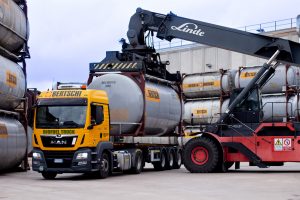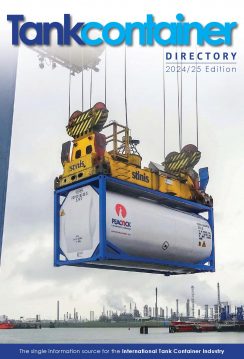Bertschi, a global leader in chemical logistics, and Dow Inc., a world-leading materials science company, have initiated a groundbreaking pilot for sustainable transportation, from the Netherlands to Italy, combining intermodal rail and biofuel-engine trucks. This collaborative effort marks a significant milestone for both companies in their commitment to sustainability and reducing carbon dioxide (CO2) emissions.
Bertschi, the market leader in European intermodal chemical logistics, is continuously exploring strategies to enhance the sustainability of its door-to-door solutions. Today, Bertschi operates 90% of all European land transport via intermodal rail transport, reducing its transports’ CO2 emissions by 230,000 tons annually. Focus has been placed on optimizing the first and last-mile
Segments of the supply chain that are carried out by road. Hydrogenated Vegetable Oil (HVO) stands out as a valuable substitute for traditional diesel.
HVO, sourced from renewable materials, is globally acknowledged for its potential in significantly reducing carbon emissions. Through the adoption of HVO for road transports in the supply chain, both Dow and Bertschi are proactively advancing environmental objectives while championing responsible logistics solutions. The key advantages of integrating HVO into logistics operations include a notable reduction in CO2 emissions for the first- and last-mile by up to 90%, reduced dependency on fossil fuels, and potential enhancements in engine performance.
Emphasizing substantial CO2 reductions during the last-mile transportation, the pilot program involves a specialized fleet of Bertschi trucks powered by HVO fuel. The project involves the sustainable transport of Dow products from Terneuzen in the Netherlands to a receiver in Northern Italy. Biofuel-engine yard shunters first execute the loading in Terneuzen. The main leg to Italy is then carried out by intermodal rail departing from Bertschi’s intermodal terminal in direct proximity to Dow’s plant. The last mile is then completed by a Bertschi biofuel-engine truck from the Italian intermodal terminal. This initiative showcases the viability and effectiveness of sustainable door-to-door supply chain with the integration of intermodal rail and bio-fueled trucks. The aim is to comprehensively analyze the emissions reduction and environmental benefits facilitated by HVO compared to traditional diesel, with a dedicated focus on minimizing the carbon footprint linked to transportation activities.
"We are enthusiastic about the potential of HVO as a sustainable substitute for diesel during our first and last-mile road deliveries," affirmed Santiago Gonzalez, Managing Director for Bertschi Liquids at Bertschi. "This pilot program strongly affirms our dedication to environmentally responsible practices, significantly enhancing the efficiency and sustainability of our logistics operations,” he continues.
Chloé Sanders, Senior Sourcing Manager at Dow, echoed this sentiment, stating, "We firmly believe in the collective responsibility for sustainability. Initiatives like this pilot program exemplify our commitment to reducing our carbon footprint and fostering a positive impact on the environment."
Through collaborative initiatives, Dow and Bertschi aim to not only pave the way for sustainable logistics practices but also inspire a broader industry shift towards a greener, more eco-conscious future. October 17, 2023
Bertschi, the market leader in European intermodal chemical logistics, is continuously exploring strategies to enhance the sustainability of its door-to-door solutions. Today, Bertschi operates 90% of all European land transport via intermodal rail transport, reducing its transports’ CO2 emissions by 230,000 tons annually. Focus has been placed on optimizing the first and last-mile
Segments of the supply chain that are carried out by road. Hydrogenated Vegetable Oil (HVO) stands out as a valuable substitute for traditional diesel.
HVO, sourced from renewable materials, is globally acknowledged for its potential in significantly reducing carbon emissions. Through the adoption of HVO for road transports in the supply chain, both Dow and Bertschi are proactively advancing environmental objectives while championing responsible logistics solutions. The key advantages of integrating HVO into logistics operations include a notable reduction in CO2 emissions for the first- and last-mile by up to 90%, reduced dependency on fossil fuels, and potential enhancements in engine performance.
Emphasizing substantial CO2 reductions during the last-mile transportation, the pilot program involves a specialized fleet of Bertschi trucks powered by HVO fuel. The project involves the sustainable transport of Dow products from Terneuzen in the Netherlands to a receiver in Northern Italy. Biofuel-engine yard shunters first execute the loading in Terneuzen. The main leg to Italy is then carried out by intermodal rail departing from Bertschi’s intermodal terminal in direct proximity to Dow’s plant. The last mile is then completed by a Bertschi biofuel-engine truck from the Italian intermodal terminal. This initiative showcases the viability and effectiveness of sustainable door-to-door supply chain with the integration of intermodal rail and bio-fueled trucks. The aim is to comprehensively analyze the emissions reduction and environmental benefits facilitated by HVO compared to traditional diesel, with a dedicated focus on minimizing the carbon footprint linked to transportation activities.
"We are enthusiastic about the potential of HVO as a sustainable substitute for diesel during our first and last-mile road deliveries," affirmed Santiago Gonzalez, Managing Director for Bertschi Liquids at Bertschi. "This pilot program strongly affirms our dedication to environmentally responsible practices, significantly enhancing the efficiency and sustainability of our logistics operations,” he continues.
Chloé Sanders, Senior Sourcing Manager at Dow, echoed this sentiment, stating, "We firmly believe in the collective responsibility for sustainability. Initiatives like this pilot program exemplify our commitment to reducing our carbon footprint and fostering a positive impact on the environment."
Through collaborative initiatives, Dow and Bertschi aim to not only pave the way for sustainable logistics practices but also inspire a broader industry shift towards a greener, more eco-conscious future. October 17, 2023
You currently do not have access to this article, please login or register to read more.
Login to read more






